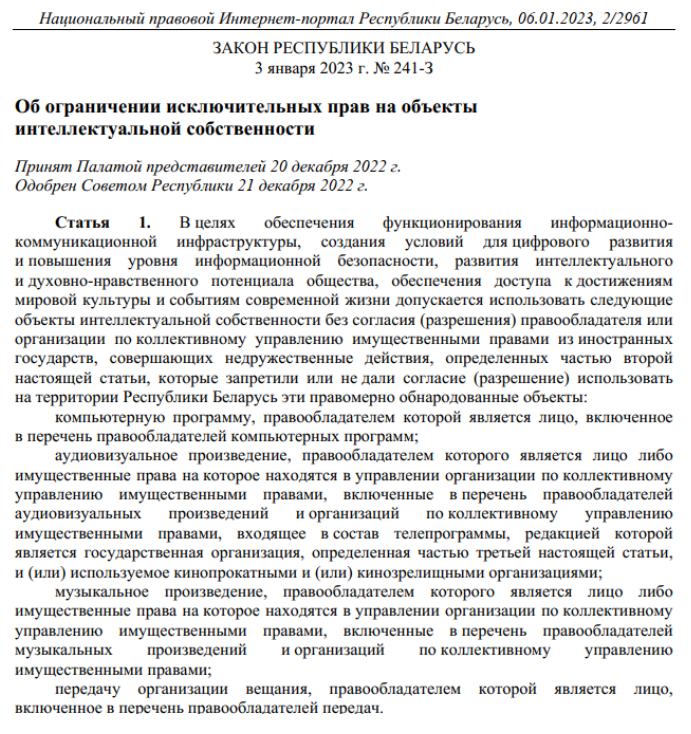Belarus Legalizes Piracy of Movies, Music & Software of ‘Unfriendly’ Nations
Belarusian dictator Alexander Lukashenko has signed a new law that legalizes piracy of movies, music, TV shows and software owned by rightsholders from 'unfriendly countries'. The law also allows goods protected by intellectual property law to be imported from any country without obtaining permission from rightsholders.
piracy encryptIn 1994, a new Belarusian constitution led to a democratic presidential election from which Alexander Lukashenko emerged as the country’s leader.
Lukashenko remains in power today due to a series of landslide election ‘victories’, a similar result in a referendum to remove presidential term limits, and the support of Russian leader Vladimir Putin.
In 2021, Lukashenko ordered the hijacking of Ryanair Flight 4978. The United States responded bycharging Belarusian officialswith aircraft piracy. The Belarus dictator now has another type of piracy in mind that will lead to further isolation on the world stage.
Belarus Needs Access to Foreign IP
Lukashenko’s support for Russia’s invasion of Ukraine led to new sanctions being imposed by theU.S.,EU,UK, and other countries.
In common with Russia, Belarus relies on intellectual property owned by foreign rightsholders that are currently unable or unwilling to supply and/or license it. So, to ensurelegalaccess to pirated movies, music, TV shows and software, the government drafted a new law to restrict intellectual property rights.
Adopted by the House of Representatives (lower house) on December 20, 2022, and the Council of the Republic (upper house) a day later, Lukashenko signed its provisions into law on January 3, 2023.
New Law Legalizes Audiovisual Piracy
The law‘On the limitation of exclusive rights to objects of intellectual property’targets rightsholders or collective management licensing organizations representing multiple rightsholders.
If these are from foreign countries “committing unfriendly actions” against Belarus, “which forbade or did not give consent” for lawfully published items of intellectual property to be used in Belarus, their exclusive rights relating to specified product classes will be limited.
In this case, rightsholder permission will not be required for content to be used in Belarus.

The law specifies computer programs and audiovisual works, including movies, music, and TV shows. The document states that film distribution, cinema organizations, and broadcasters are covered by the law, suggesting that first-run movies and live TV channels will also be affected.
Belarus is asignatoryto several major intellectual property treaties administered by the World Intellectual Property Organization. None have a reputation for accommodating state-sanctioned piracy.
Those Who Use Unlicensed Content Must Pay For It
The new law – which effectively disposes of exclusive rights for those affected – states that when people/entities make use of unlicensed/pirated content, remuneration must be paid directly to bank accounts operated by the state-owned National Patent Authority.
Any funds sent to these accounts will be held for three years from the date of credit, enabling rightsholders to claim what is legally theirs. If they fail to do so, Belarus will keep their money.
“After three years, the remuneration not demanded by the right holder or the organization for the collective management of property rights will be transferred by the Patent Authority to the republican budget within three months,” the text reads.
The Small Print…..
Depriving rightsholders of all rights except the right to get paid might sound like a “better than nothing” deal, but that assumes foreign rightsholders will actually get paid.
Under this new regime, it appears that rightsholders’ will be denied their right to determine a market price for their content. Instead, the lower house of the Belarusian parliament will determine the market price based on unknown factors.
Even if we assume that people using foreign content will declare that use to the government, Belarus says that rightsholders must reimburse the Patent Authority for its management and accounting expenses. The authority must not deduct “more than 20 percent” from the funds collected but given the authority can spend those deductions on whatever it likes, there’s certainly an incentive to take more rather than less.
But what if Belarus charged the full market rate for movies, music and software and administered the scheme for free – could rightsholders settle for that?
As mentioned earlier, rightsholders have to claim the money from the Patent Authority. And according to the Belarus National Center of Intellectual Property, the Patent Authoritybankswith Belarusbank in Minsk. The government owns 99% of the bank and both are subject to sanctions.
Parallel Imports
Another feature of the new law relates to unlicensed parallel imports “to create conditions for increasing the internal stability of the economy” and “preventing or reducing a critical shortage in the domestic market of food and other products.”
When these parallel imports contain or include items covered by intellectual property law, permission from rightsholders will not be required. This applies to ‘unfriendly countries’ and friendly countries alike, with one caveat.
When rightsholders from ‘friendly countries’ cooperate with Belarus, the law says that only “critical shortages of these goods….in the domestic market” will lead to their rights being removed.
The law(pdf)will come into force this week and remain in place until December 31, 2024.
-
Previous:
-
Next:
This article has no related articles!






